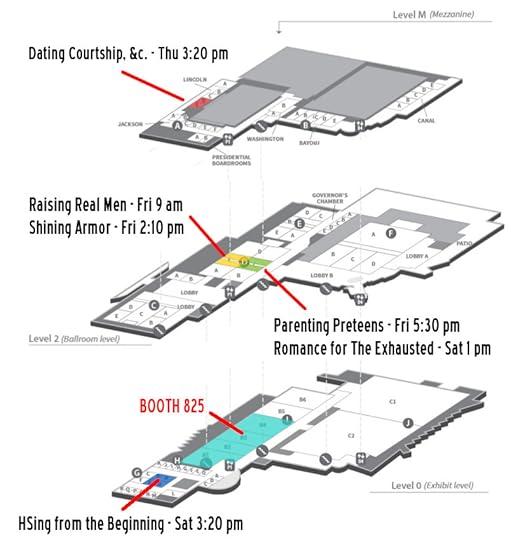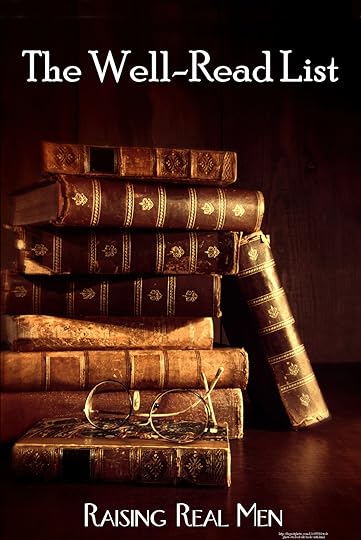Hal Young's Blog, page 8
March 4, 2018
Welcome to Teach Them Diligently – Nashville!
Thursday
3:20 pm
Dating, Courtship, and All That
Lincoln D/E
Friday
9:00 am
Raising Real Men – Surviving and Appreciating Boys
Presidential E
2:10 pm
Shining Armor – Your Son’s Battle for Purity
Presidential E
5:30 pm
Parenting Preteens
Presidential C
Saturday
1:00 pm
Romance for The Exhausted
Presidential C
3:20 pm
Homeschooling from The Beginning
Ryman A/B/D/E

Find Us In The Book Fair!

Booth 825 – GREAT WATERS PRESS
Right next to Lamplighter and Cat and Dog Theology

NEW THIS YEAR!
Love, Honor, and Virtue – Audiobook Edition
The Sky Pilot – Audiobook
Celebrating Christ in History: Reformation Day – unit study, songbook, and cookbook, too!
New Craft and Skill Kits – Wood Carving, Chef Kit, and Furniture Building!
Teach Them Diligently – Nashville 2018
Thursday
3:20 pm
Dating, Courtship, and All That
Lincoln D/E
Friday
9:00 am
Raising Real Men – Surviving and Appreciating Boys
Presidential E
2:10 pm
Shining Armor – Your Son’s Battle for Purity
Presidential E
5:30 pm
Parenting Preteens
Presidential C
Saturday
1:00 pm
Romance for The Exhausted
Presidential C
3:20 pm
Homeschooling from The Beginning
Ryman A/B/D/E

Find Us In The Book Fair!

Booth 825 – GREAT WATERS PRESS
Right next to Lamplighter and Dog and Cat Theology

NEW THIS YEAR!
Love, Honor, and Virtue – Audiobook Edition
The Sky Pilot – Audiobook
Celebrating Christ in History: Reformation Day – unit study, songbook, and cookbook, too!
New Craft and Skill Kits – Wood Carving, Chef Kit, and Furniture Building!
February 24, 2018
Review: Black Panther
We all know the truth: more connects us than separates us. -T’Challa
Stunningly beautiful, Black Panther surprises with a message of unity and mercy rather than division and retribution.
The story opens at the end of Captain America: Civil War as T’Challa, prince of Wakanda, returns to the hidden nation to assume the throne after the death of his father. He faces some unexpected challenges, but fights his way through them to inherit the kingdom. It’s not long before a more serious challenge arises, though, one that would cost T’Challa, his country and even the world a very great price.
To be fair, I love superhero movies. I love epic battles between right and wrong. I love bigger than life heroes. So, I hoped Black Panther would be more than a politically correct showpiece. I hoped it would be fun.
I wasn’t disappointed.
Black Panther was fun! The aesthetic was amazing. Wakanda’s tech was sufficiently different from the norm to be believable as the science of a hidden culture. Scenes of Wakanda such as the vibranium mine, the Jabari throne room, and giant stone panther and ape are delightful. Although Wakanda is portrayed as an extremely wealthy high tech nation, it’s interesting that set modelers included bazaar and low rent district cityscapes. That’s true to life for big cities around the world, but Wakanda is supposed to be a nation of unparalleled peace and prosperity. Perhaps that’s a nod to the impossibility of achieving a perfect society even in Wakanda.
Chadwick Boseman, as T’Challa, well portrays a noble leader who wants to do right and to do right by his people. His growth comes through learning the truth about his father and realizing that his priorities may need to change. Letitia Wright, as his sister Shuri, provides some levity and fun as the Q (the scientific genius and gadget master of the James Bond movies) of Wakanda. Both Shuri and T’Challa’s love interest, Nakia, have major, plot-critical roles in the film. Martin Freeman, as the bumbling, but noble CIA officer Everett K. Ross is, well, Martin Freeman — always funny and endearing whether a hobbit, a Watson, or a spy.
The themes of Black Panther are really good. One major theme is noblesse oblige (pronounced NO-bless OH-bleejzh), the age old obligation of people with more nobility, power, wealthy, strength, or other gifts to act with generosity and mercy toward the underprivileged. One of the basic conflicts of the movie concerns whether or not Wakanda should maintain its anonymity and safety or use its wealth and knowledge to help the less fortunate.
Another theme is that it is wrong to do evil that good might come. Notice T’Challa’s commitment to following the rules even when it hurts him. Also, although Nakia and General Okoye make opposing decisions about how to handle Killmonger’s coup, they both are basing those decisions on principle. By contrast, Killmonger desires to help people of African descent around the world, but his plan would bring death and destruction in order to bring that about. Killmonger promotes violence and retribution as the answer to the problems of the underprivileged.

The final theme is that people are more alike than different, so our history or ancestry should not divide us. I really appreciated that Black Panther stood clearly on the side of right — of peacemaking, education, and forgiveness and against hate and violence.
There were a few problems in this otherwise excellent movie, though. Animism and ancestor-worship were not only accepted as true, but actually shown in the movie as real. T’Challa visits and consults with his dead father and ancestors. For this reason, I don’t believe Black Panther is suitable for anyone young enough not to really get that it’s a made up story, no matter how engaging. With kids of any age, you’ve got to discuss this. In much of the Marvel universe, false gods are exposed as people misunderstanding a more advanced technology. In this case, though, the false religion is given credibility.
Costuming might be an issue for some viewers. There are quite a few scenes with bare-chested guys. Some female costumes are form-fitting and have bare midriffs and shoulders. There’s almost no sexual content in the movie at all, though. There is some foul language, but it’s relatively infrequent and is most often spoken by bad guys. Older kids should be able to filter it out, but it may be problematic for younger ones.
Naturally, there was a good bit of violence. Ritual combat and outright battle scenes happen several times. Stabbing, shooting, and blasting is common. The violence is not particularly depraved, bloody, or shocking, though.
The CG was great, but there are a few weird moments. Watch the people dancing on the cliff during the initial challenge to the throne. What was also weird is how very little we got to see of Black Panther in action. Most of the fighting happens after a potion has been administered to remove T’Challa’s Black Panther powers for a time. That’s just strange in a movie where he’s the title character. I wanted to see more of him in action and more of his new suit in particular.
Generally, this film was a nice addition to the Marvel Universe and one that should spark some good discussion in your family. We’d recommend it for preteens and up.
Listen, though. Like all Marvel movies, there are bonus scenes in the credits. Never leave a Marvel film until the last credit has rolled up the screen. In Black Panther, you’ll miss the statement that really drives home the theme if you don’t wait until at least the mid-credit scene before you leave.
Questions for Discussion (Spoiler Alert!):
Why did T’Challa’s father kill his brother? (He was protecting his friend who was about to be killed.) Was he right to do that?
Why did T’Challa’s father leave behind his brother’s son? (He was afraid to expose the existence of Wakanda to more people.) Was he right to do that?
Why did Killmonger order the heart-shaped herb to be destroyed?
Killmonger is motivated by revenge. What does the Bible say about revenge? (Romans 12:19)
After taking the heart-shaped herb, T’Challa sees and talks to his father after he has died. Is that Biblical?
The Wakandans worship their ancestors and pray to them and the black panther idol, Bast. Who does the Bible say we should worship? (Exodus 20:1-4, Deuteronomy 6:4) Should we pray to our ancestors? (1 Timothy 2:5)
What is one of the themes of this movie? The theme is what the screenwriter and director want us to believe or do because we watched the film. It’s what they are trying to teach us. (See above)
Black Panther, PG-13, Recommended for more mature preteens and up.
Enjoy!
Melanie

February 21, 2018
The Preacher and the Presidents
Book Review: Nancy Gibbs and Michael Duffy: The Preacher and the Presidents: Billy Graham in the White House (New York: Center Street, 2007). 413 pp.
For half a century, the evangelist from Charlotte was the defining figure in American evangelicalism. He was also the de facto chaplain to the White House, completely unofficially, and counted 10 of the last 11 presidents as personal friends. The Preacher and the Presidents is a sympathetic history of the remarkable career of a minister whose pastorate was made up of First Families, the evangelist whose love for politics put him on a tightrope between two worlds, and a confidant to chief executives of both parties.
Give and take, not quid pro quo
In 1949, Billy Graham was a rising young preacher, suddenly in the spotlight, thanks to media moguls Henry Luce and William Randolph Hearst. He was also an interested observer of politics, and his first contact with the White House was a commonplace request for a congratulatory note from President Harry Truman at the opening of a Christian radio station.
When several months later he found himself invited to the Oval Office, Graham was overwhelmed by the moment and nearly forgot his pastoral message to Truman — then he overplayed it. In a scene worthy of Frank Capra, Graham and his colleagues were ambushed by photographers who cajoled them into kneeling for prayer on the sidewalk outside the White House. Truman was furious, and Graham later asked his forgiveness. “That’s all right,” Truman said. “I knew you hadn’t been briefed.”
Graham immediately realized that any visits to the president had to stay strictly off the record. His first instinct was correct — the country’s leaders often needed spiritual comfort and counsel, and some would cling to Graham as an emotional lifeline — but he would have that opportunity only if he kept his focus on ministering to the man, and not in cultivating the public figure.
From that stumbling start, Graham developed a series of friendships as unique as they were complex. The presidency is at once the most visible and the most isolated position in the nation; a disinterested friendship is the rarest commodity. “Every president needs some people around him who still call him by his first name and tell him exactly what they think,” Graham said. “He becomes isolated partially because even his friends are afraid to tell him the truth.”
Graham lived in the same glare of publicity the presidents did, so he didn’t need to borrow from the prestige or influence associated with their office. He was fascinated with the inner working of politics, but never sought position or fame from his relationship with the White House. Staff members recollect that Graham, of all visitors, never came with a personal agenda, and when suggested as a possible candidate for office — Nixon once offered him his choice of ambassadorships — he always declined, saying, “I was called to preach, not to govern.”
That is not to say that either side missed the practical value of their relationship. One of the most interesting themes in the book is how Graham and the presidents gingerly balanced their separate worlds at the intersection of two kingdoms. Politicians found it useful to be seen with Graham, and the preacher was willing to coach them on their message to religious voters and share observations from his wide contact with the American public. While Graham didn’t use the presidents for personal gain or fame, he did ask them to put in a word with foreign leaders occasionally. In places such as North Korea and Russia, it opened doors normally closed to Christian missionaries.

God’s man for the time
Graham prayed constantly for the country’s leaders and for God’s guidance over upcoming elections. As a result, he believed a sort of vox populi, vox Dei, and sincerely told whomever gained the office that he was God’s choice for the times. Graham said he grew close to 10 of the last 11 presidents, both Democrat and Republican (he is registered the former and voted the latter), and the feeling was obviously reciprocated — most of the time.
The odd man in the bunch was not the Roman Catholic John F. Kennedy, the duplicitous Richard Nixon, nor the scandal-ridden Bill Clinton. It was Jimmy Carter, a fellow Baptist who once organized a Billy Graham Crusade in Georgia. The authors suggest several reasons for this. Carter was an intensely private man, they said, and he might have been more self-reliant about his faith than other presidents. Graham was still recovering from the fall of his friend Nixon just two years earlier, and he might not have reached out as eagerly as before.
On the other hand, the book omits Carter’s growing hostility toward conservatives in the Southern Baptist Convention, later grouping them with radical Islamists as a threat to the nation, and his public break with the SBC in recent years.
This book is not hagiography, though the authors plainly grew to like their subject and handle him with respect. Graham believed that when the apostle Paul wrote that “all have sinned and fall short of the glory of God,” it meant presidents struggled with the same failings and doubts as any man, so they needed to hear the same message of redemption and forgiveness Graham preached in stadiums. That gave him the boldness to seek out and befriend powerful men for their own good, though he freely admits it nearly compromised him sometimes. That was the temptation he had to combat for 50 years. As The Preacher and the Presidents demonstrates, there is a place where politics and religion can mingle without mixing, and on the whole, Graham managed to negotiate it with reputation and ministry intact. Only time will show whether the next generation of leaders will handle the temptations as well.
Interested? Click here and get The Preacher and The Presidents from Amazon (thank you for using our affiliate link!)
This review originally appeared in Carolina Journal, February 2008, p. 20. www.CarolinaJournal.com.
Hal

February 5, 2018
I Haven’t Kept All My Resolutions Either
So February comes trudging in sooner than we expected.
You history buffs may already know that the ancient Roman calendar started in March, not January – so February was the end of the year to them. The name comes from februum for “purification” because this is when they traditionally got rid of the old year’s traces and prepared for the new. (Never mind how they did it, being pagan and all.)
While a lot of people make new starts for the New Year, by the first turn of the calendar at least half of us are struggling or defeated. Sheer “resolve” and best intentions don’t last long for most of us. I had eight on my list this year; last I checked, I was okay with four of them, two were … so-so, and two were flat-lined. No progress at all.
So what do you do when your New Year’s resolution has died?
Recognize we all fall short of the glory of God (Romans 3:23) – even when we haven’t sinned. We won’t ever reach perfection on this side of heaven. When we stumble in a good intention, whether to read the Bible with our kids, to get out and walk more, or to quit [insert bad habit here], well … it shouldn’t be a surprise to us. If it’s not a matter of sin, then don’t beat yourself up if you fall short. Here’s a great article about keeping the right attitude (hint: humility and faith) about our resolutions.
Start over. Begin again. Continue beginning again as needed. I remember a senior pastor who had trained hundreds of young preachers in his career, admitting to a classroom full of his students that the most difficult thing he faced as a Christian, every single day, was simply to read the Word and pray. Maintaining personal devotions was a struggle for him!
If you miss a day on your Bible reading plan, do you let it drop and say, “Poor rotten me. I meant well but it’s all over now. No point in it”? If you miss a week? If you got totally overwhelmed and only remembered when a month had slipped past? No, you pick it up and start where you left off.

I say again, Start over. Begin again. Continue beginning again as needed.
Peter asked Jesus what to do about a brother who sinned against him but asked forgiveness – again and again. “Do I forgive him up to seven times?” Peter asked. Jesus said, “Seventy times seven.” (Matthew 12:21-22)
That speaks of our attitude of forgiveness toward others, but there’s something else in the background – some things, for some people, are likely to be an ongoing struggle with lots of setbacks. If we’re called to give grace to a brother who disappoints or hurts us, shouldn’t we give grace to ourselves when we disappoint ourselves?
Again, I’m not talking about sin. That’s against God. Go to war with sin and don’t negotiate peace with it.
But when it’s simply our own goals, like going to the gym every day, or losing 15 pounds this month, or watching less Netflix … don’t trample your soul in the dust over good intentions that didn’t quite gel. Remember your plan, correct your course, and move forward from here!
One of the things I say or think – often – is the simple rule of the golf course: You’ve got to play the ball where it lies. It’s good to look back and note where you made the mistake, where there’s an opportunity for improvement (or a need for repentance) … but you can’t change the past, and often you can only choose whether to fix the blame or fix the problem. And you need to fix the problem to make progress!
Make yourself a New Year every month. I saw a business book that suggested working in short cycles – as if every business quarter was a fresh start on the year. That may or may not make sense for each person’s case, but why not say to yourself, “Hello, new month! Did I made any progress on last month’s goals? Okay. Recalculate. Where do I go from here?”
Paul spoke of the believer’s continuing journey to become more and more like Christ. He admitted (the apostle! who had spoken with Jesus in person!) that he hadn’t arrived yet:
“Not that I have already attained, or am already perfected; but I press on, that I may lay hold of that for which Christ Jesus has also laid hold of me. Brethren, I do not count myself to have apprehended; but one thing I do, forgetting those things which are behind and reaching forward to those things which are ahead, I press toward the goal for the prize of the upward call of God in Christ Jesus.” (Philippians 3:12-14)
We are a work in progress. In many respects we aren’t the same person from one year to the next – we continue to grow, our experience lengthens, our situation changes. Rather than thinking, “If only I can achieve Goal X this year, then I will be satisfied and complete,” let’s think of that journey we’re on – pressing forward, letting things in the rear view mirror stay back there, and continuing on for a closer walk with Christ in the days and weeks and years ahead.
February 3, 2018
Quick Takes on the Big Game Commercials
It’s reported that NBC has received over $500 million in advertising revenue for this year’s Super Bowl. It’s such a big event, companies pull out all the stops for this one night — and some people admit to watching the game as much for the advertisements as for the football! Our son Caleb took a look at the ads which have been previewing this week and gives us this capsule report …

Budweiser – “Stand by You” – Big Beer loves you and will make water for you so that you can live long enough to buy more beer. Budweiser using its canning facilities to pack water for disaster relief.
Stella Artois – “Taps” – Buy our limited edition rare glassware as hocked by a celebrity, and we will take a fraction of the profit to buy clean water for people overseas.
Amazon – “Did Alexa Lose Her Voice?” – Alexa goes hoarse, so celebrities fill in? Some hilarious, some regrettable. Some unfortunate language, a scene with someone in a bathtub (under lots of bubbles). Parental Advisory: Not for kids, parents will laugh.
Amazon – “Tom Clancy’s Jack Ryan” – Lots of shooty stuff, things go boom, patriotic audio backer track, one kissy sequence.
PETA –“Redemption” – No. Blasphemous, mockery of religion. Shameful. Skip it.
Pringles – “WOW” – Bahahaha. NO BODY ASKED YOU KEVIN! Still laughing.
M&M’s – “Human” – Ummm… no. Sexual humor involving Danny Devito as the red M&M? Inappropriate unless you want to explain oral sex to your kids Sunday night.
Tide – “Bradshaw’s Locked Out” – TEASER ONLY SEEN, No idea, no hint as to whats happening…besides some guy named Bradshaw being locked out of a trailer that has a Tide logo on it.
Michelob Ultra – “The Perfect Fit” – Baha, snark. Chris Pratt over prepares for a advertising role.
Michelob Ultra – “I Like Beer” – Chris Pratt and a bar crowd sing Tom T. Hall’s 1975 song of this title. Scenes of everyday athletes and bad yoga. Pretty funny.
Universal Studios – “Peyton Manning: Vacation Quarterback” – Football lingo jargon vacation. Good for a cute laugh but left me feeling like a Patriots game ball.
Dorito & Mountain Dew – “Blaze vs. Ice” – Rapping midget. Morgan Freeman miming to a female singer. Odd, someone might find it funny. Pretty cool effects though.
Lexus – “Black Panther” – Superhero drives a Lexus. Yeah, that’s basically everything that goes on this one.
Febreze – “The Only Man Whose Bleep Don’t Stink” – They say “bleep,: literally, not as a bleeped in thing, but literally the word. Entirely totally awkward. Just … don’t, okay?
Groupon – “Who Wouldn’t” – Support Local Business, or we will have the local football team commit assault.
Avocados From Mexico – “Bubble Dome Riot” – Riots and mayhem are perfectly reasonable responses to avocados without tortilla chips. Or losing wifi.
Squarespace – “Make It Happen” – Keanu Reaves says awkward self motivational things while standing on the seat of a speeding motorcycle. This totally makes me want to make a website.
Bud Light – “Ye Olde Pep Talk” – Renaissance demotivational speech, but who cares cause we don’t have Bud Light and they do! Attack? Uhh, okay?
Pepsi – “Pepsi Generations” – Don’t know the name of the ad but they have Cindy Crawford doing a Pepsi ad 26 years after she did what is supposed to be a famous ad. No idea, happened before I was born.

Hyundai – “Ref to the Rescue” – Crushing the egos and image of kids playing sports is a REALLY good thing if it allows you to get back to….watching sports?
Kraft – No name yet, but it’s gonna be a featured commercial of real families on game day. Could be good.
Wendy’s – Smack talk, McDonald’s frozen meat….”The Iceberg that sank the Titanic was frozen too.” OUCH. #TooSoon
Skittles – Ummm, Probably won’t actually broadcast one, because they are streaming it on face book to a single teenager and hoping for it to go viral by sharing and word of mouth? Ok, no recommendation here. There is a teaser
Sprint – No name, but its supposed to feature a female robot who is learning how to do things. Weird.
Jack in the Box – “#JackVsMartha” Martha Stewart versus creepy mascot. One instance of foul language.
Olympics – “Best of U.S.” – Starring Lindsey Vonn, backing track has some awkward lyrics. Its also a commercial about a skier….and the music is about a girl on fire….Confused.
Kia – “2018 Kia Stinger” – Steven Tyler drives very fast. Backwards. And goes back in time?
The Voice – Singing. Duh.
Remember, every 30-second commercial wants to tell you a story and convince you of something — have fun picking out the themes of this year’s batch of Big Game commercials! Sign up for our newsletter and get reviews of new media, great original resources, and links to all kinds of things to help make Biblical family life practical in your home —
January 26, 2018
Movie Review –The Post
Everyone thought newspaper heiress Katherine Graham was in over her head in serving as the publisher of The Washington Post, but then she had to face a decision that would rock even the most experienced newspaperman.
It was 1971 and Americans were growing weary with the war in Vietnam. The first military advisors were sent in 1950, over twenty years earlier, and U.S. involvement had escalated in the 1960s, particularly after the Gulf of Tonkin incident in 1964. It was beginning to look, though, that victory was not going to be possible and American servicemen were dying for nothing.
Feelings were running high. Protesters were demanding an end to war and tragically, many took out their anger on innocent troops. The excesses of the protesters made many support the war who might otherwise have opposed it. Tempers were rising all over the country.
Into that turbulent time the Pentagon Papers dropped like a bomb. The Papers were a broad, detailed, historical study of U.S. involvement in Vietnam, commissioned by the Department of Defense, and including classified government documents. Daniel Ellsberg, who had been involved in the study but came to oppose the war, decided that Americans needed to know the truth of their government’s intentions and involvement in Vietnam, and released a large part of the classified report to the New York Times.
The Times broke the story on June 13th, but soon faced an injunction to immediately cease publication on the grounds that they were releasing classified information. That left the Washington Post in a bind. If they published, it could mean it could mean legal and financial disaster; if they didn’t publish, were they even a real newspaper?

The story hinges on the decision of Katherine Graham, a woman who never planned to be a newspaper magnate. She said, “I liked my life [as a wife and mother]!” The suicide of her husband left her with no alternative but to take up the family business or lose it.
The Post is a mostly truthful recounting of a pivotal time in American history and particularly in the relationship between the government and press. Although lacking in nuance in regard to debate surrounding the War and the necessity of classified documents to governance, the story is a gripping, insightful, and enjoyable peek into the lives of the people who lived through those times.
One of the most delightful things about the film is the character of Katherine Graham, played winsomely by Meryl Streep. Her femininity is undeniable, especially in her concern for the people and relationships impacted. She finds her feet in the newspaper industry in this tale, finally declaring, “This is MY paper.” The balance of showing her as a thoughtful, intelligent, strong leader without denying her womanhood or denigrating her life as a wife and mother before she was widowed was a refreshing change from many recent releases.
There were few negative elements in The Post. There was some language, but it was not egregiously pervasive or intense by today’s standards. The Lord’s name is used in vain several times. There was no sexual content.
Themes: Do what you believe is right, no matter what it costs you. A free press is essential to freedom. Journalism is reporting all the news, not just what pleases your friends. Classified document laws aren’t meant to hide the misdeeds of those in government from the people.
Things to talk about with your teens:
Why was everyone trying to tell Kay Graham what to do? Why did they believe she couldn’t manage the paper on her own?
Why did Daniel Ellsberg steal the papers from RAND and leak them to the press? What was he trying to accomplish? Was he justified?
Why was the Washington Post at odds over whether to publish the papers? What were the possible consequences either way?
An important issue in this movie is whether the government has the right to exercise prior restraint, or pre-publication censorship. Why do you think the Supreme Court ruled against prior restraint in this case?
The Post, PG-13 – Highly Recommended for Teens and Adults, Language cautions for younger children.
January 25, 2018
Movie Review: 12 Strong

“Nineteen men attacked our country. The twelve of you are the first to fight back.”
12 Strong is the story of the Army Special Forces team which dropped into northern Afghanistan 39 days after 9/11, our first military response to bin Ladin’s terrorist network. Their mission was to link up with an Afghan commander named General Dostum, earn his respect, and fight alongside his men as their link to American air power.
The goal is to capture a Taliban stronghold called Mazar-i-Sharif. But they are in a race against the Afghan winter (which even the Russians considered brutal), dealing with incredibly rugged terrain that can only be crossed on horseback, engaging in a guerilla war where the friends and enemies are indistinguishable – and in fact, sometimes change sides without warning.
And although team members have seen combat experience in Somalia and Operation Desert Storm, their young captain hasn’t been under fire yet.
That’s the major focus of the film – the three-week baptism of fire for Captain Mitch Nelson (played by Chris Hemsworth). The title speaks of twelve men, but the story follows Nelson almost exclusively – the viewer doesn’t meet most of the team. Nelson has to prove himself – every officer knows he has to inspire confidence, but eventually it’s got to be tested. Nelson’s won the confidence of his team and (somewhat) convinced his commander, but he has to win the trust of the Afghan general and prove his “swagger” is more than talk. And he has to fulfill a promise to his wife – to make it back.
This is a very intense film – the scenery itself is eye-popping, and the frequent combat sequences are jarring and bloody. The R-rating is well deserved; we see raw brutality at the hands of the Taliban, there is multiple head shots with flying blood and splattered brains, and dismembered body parts on the battlefield.
And there’s profanity – lots of it. Lots and lots and lots. As a former military officer myself (who went on to become a factory supervisor and construction engineer), I’ve heard enough to say this is realistic – in some circles, it’s so much a part of the vocabulary you can become numb to it. It may be problematic for some viewers.
And there one image you’re unlikely to ever see anywhere else – Green Berets on horseback, attacking a Soviet rocket launcher with automatic weapons. It actually happened.
Major Themes
Trust – Throughout the film, the challenge is to create and maintain trust – by proving trustworthy. Although Nelson has never been in combat, his team of veterans has learned to trust his leadership during the intense ongoing training of Special Forces; once he’s in the field, he has to live up to that expectation. When he is about to deploy, his wife says, “I don’t care how long you’re gone, so long as you tell me you’re coming home.” “It’s bad luck to say that before a mission,” he says. “But I need to hear you say it,” she says, and so he does. When his warrant officer suggests he leave a farewell letter like the rest of the team members, “in case something happens,” Nelson growls, “I promised my wife I’m coming home. I’m not writing her a letter that I broke my promise.” The team’s first mission is to earn the trust of General Dostum – which they do on the battlefield. And when they return to base, the commander meets Nelson at the helipad with the laconic comment, “You kept your promise” – not knowing he’d kept several.
Integrity – Closely related to the character of trust. Nelson is all about the mission – and his team is all about following Nelson. In spite of provocation, the Americans never waver in their “professionalism,” which is to say, their behavior as honorable soldiers in the Judeo-Christian ethos. They never abuse their power, never lose their self-control, and hold their fire when confronted by a potential suicide bomber or ambush. When their supply drop is stolen by villagers they buy the equipment and provisions back in the marketplace. When hungry troopers encounter a lone shepherd in the mountains, they do not commandeer one of his sheep but negotiate a price and pay him. They are not bullies or conquerors but allies and, it seems, ambassadors. (See Luke 3:14 for comparison!)

Chaos – Combat is not neat, but the situation in Afghanistan is particularly nasty. Several characters reference the old nickname, “Graveyard of Empires,” and there are reminders of Russia’s failure to control this wild land – including abandoned Soviet weaponry in use by the Taliban forces. Nelson observes that Dostrum is not fighting one war but several – the Taliban first but rival warlords a close second. When Dostrum extends an informal truce to a rival, Nelson says, “You made the right choice,” and Dostrum replies, “Here, there are no right choices.” He warns the young captain, “The Americans will become just another tribe. We will be friends today, and tomorrow we will be enemies.” There is a fatalism in the history of this barren country.
But the general concludes, “but you … will always be my brother.” So that mission, at least, is clearly accomplished.
Conclusion
The film (based on a true story with a few changes) is exciting, no question. In the middle of the confusion, there are definite lines of right and wrong. Certainly it shows that militant Islam is a threat to fellow Muslims first, before it reaches out to the infidel West. There are some good themes and messages, though some are more cautionary than encouraging – what are our chances of a lasting “win” in a country so resistant to change? – and the messages can be easily overwhelmed by the drama of combat. At least, in this case the good guys actually do win – both on screen and in real life.
Looking for more heroism your whole family can enjoy? Check out our audiobook series, Hero Tales from American History!
January 23, 2018
The Well-Read List
One of our sons has severe dyslexia and didn’t read well until he was eleven. Once he got to high school, he realized he’d missed reading a lot of the books his brothers had read. He asked his big brothers to make a list of the books they thought someone ought to read to be truly well-read. This is that list. They told him something like this:
You don’t have to read all of these or even read them all the way through, but if you at least have a passing acquaintance with these books, it will make your life richer, help you understand more of what’s going on around you, and enable you to interact with almost anyone.
Note: Some of the links below are affiliate links which give us a small commission and do not cost you anything extra.

The Bible
The Iliad – Homer
The Odyssey – Homer
The Histories – Herodotus
The Church History – Eusebius
The Republic –Plato
The City of God – Augustine
The Works of Josephus – Josephus
The Wealth of Nations – Adam Smith
How to Win Friends and Influence People – Dale Carnegie
The Adventures of Huckleberry Finn – Mark Twain
Hamlet – William Shakespeare
King Lear – William Shakespeare
Pride and Prejudice – Jane Austen
Cry the Beloved Country – Alan Paton
Little Women – Louisa May Alcott
Economics in One Lesson – Henry Hazlitt
The Art of Warfare – Sun Tzu
The Hobbit and The Lord of the Rings – JRR Tolkein
The Prince – Macchiavelli
The Swiss Family Robinson – Johann David Wyss
Robinson Crusoe – Daniel Dafoe
The Nine Tailors – Dorothy Sayers
The Politics – Aristotle
Democracy in America – Alexis de Toqueville
Watership Down – Richard Adams
The Holiness of God – RC Sproul, Jr
The Federalist Papers – Alexander Hamilton, John Jay, and James Madison
Moby Dick – Hermann Melville
Captains Courageous – Rudyard Kipling
Treasure Island – Robert Louis Stevenson
Frankenstein – Mary Shelley
The Double Helix – Watson and Crick
The Microbe Hunters – Paul de Kruif
Here I Stand (Martin Luther) – Roland Bainton
Erle Stanley Gardner’s Perry Mason novels
Earl Derr Biggers’s Charlie Chan novels
Little House on the Prairie – Laura Ingalls Wilder
Winston Churchill – Paul Johnson
Agatha Christie’s Hercule Poirot (suggest Death on the Nile) and Miss Marple novels
The Screwtape Letters – CS Lewis
Mere Christianity – CS Lewis
The Space Trilogy – CS Lewis
A Christian Manifesto – Francis Schaeffer
Addicted to Mediocrity – Franky Schaeffer
A Modest Proposal – Franky Schaeffer
His Excellency, George Washington – Joseph Ellis
Goodnight, Moon – Margaret Wise Brown
Make Way for Ducklings – Robert McCloskey
Homer Price – Robert McCloskey
How Should We Then Live – Francis Schaeffer
Cheaper By the Dozen – Frank Gilbreth
The Forgotten Spurgeon – Iain Murray
Undaunted Courage – Stephen Ambrose
Paradise Lost – John Milton
The Faerie Queen – Spenser
Lives of the Noble Greeks and Romans – Plutarch
The Autobiography of Benjamin Franklin
Enjoy!
Hal & Melanie

January 16, 2018
Don’t Laugh. You Just Need to Understand Southerners and Snow…
We travel all over the continent speaking, so we have friends from Manitoba to Miami. Practically all of them that live north of the Mason-Dixon Line love to laugh at how we Southerners react to snow.
We admit, it is a bit humorous. Hal used to work for the power company. If he stopped at the grocery store on the way home and happened to be wearing a company jacket or hat, the cashier would get eyes as big as saucers. “Do..do..do you know something we don’t?” she’d ask in a panicked voice.
“Huh? What are you talking about?” Hal was puzzled.
“All that milk!!! Are we going to have snow????” Better grab your milk and bread now, boys and girls. The power company guys are buying supplies.
“No, ma’am. We have eight kids. Seven gallons of milk is a normal week for us.”
Let’s face it. If the weatherman so much as shows a snowflake on the map, there’s a run on the stores. Milk, bread, and comfort foods take a beating. And there are reasons that aren’t just hysteria.
You see, we Southerners don’t like to drive in the snow. Folks say we don’t know how, but many of us actually do pretty well with it; we’ve driven in a snow squall in the Colorado Rockies and crossed the plains of Canada in the teeth of a February gale, so it’s not a matter of “can’t.” We still don’t get out much when it’s snowing, because you’ve got to look out for the other folks — the ones that do see a few flakes cross their windshield and drive straight into the nearest ditch.
It’s not all our fault, anyway. Our friends up north know that snow which falls this week is likely to land on snow which was there last week – and will be under the snow which falls next week. They know snow is a long-term proposition, and life’s gotta go on – shovel it out and keep moving.
Down here, it’s a temporary condition. Our snow doesn’t last long enough to get muddy and gray. When it only comes once or twice a year and only lasts a couple of days, it just doesn’t make sense for a town to purchase the heavy snowplows and pile up mountains of salt. Leave it alone and it will take care of itself.
Our snow isn’t like your snow, either. We were amazed the first time we experienced a real Midwestern snow – you could just sweep it off the windshield. You could kneel down to look under the car and stay perfectly dry – just brush the powder off. Down here, snow is heavy and wet, if we don’t get freezing rain instead. The real problem is ice – it’s not that cold, so snow tends to melt and refreeze as ice. The roads become treacherous; we’ve had more problems driving in our little town than in Canada with two feet on the ground. (Okay, call it 60 centimeters if you like).

Ice brings down power lines, too. That’s what all the bread and milk is about. At least we can eat cereal and sandwiches if the power goes out. The Frosted Flakes and Cap’n Crunch always takes a hit when snow’s in the forecast. Snow reminds of us childhood fun and we all tend to revisit childhood in our hearts when the flurries start.
Snow is magical in the South. It’s like our Fairy Godmother. That’s a little hard to get if you live with it all the time. The mud. The nasty, dirty snow. The bother. Honestly, it would be awful to have to dress the kids for snow every time we left the house.
It’s not like that for us. It’s kind of like a story I once heard Garrison Keillor tell. One day you get on the bus to work and find out you’ve boarded the Liberty Bus. Surprise! You’re not going to work, you’re going to have an adventure instead!
That’s the way snow works around here. It’s January. It’s gray and cold and rainy. You’re lower than a snake’s belly and the kids all have cabin fever. The weeks to come just look like an endless conveyor belt of drudgery. Day after weary day of work, school, and chores following one after the other.
Suddenly you hear a cry of delight, “SNOW!” Someone peeking out the window has seen a lazy flake drift by. Both of us remember crouching by the window as children and watching hopefully for any sign of solid precipitation. When we hear that call, all of us run for the porch.
Usually it’s nighttime, and we all peer up at the streetlights for confirmation. “Yes, Yes, I see it! Snow!” Everyone dances around with delight! It’s like God waved His hand over the town and declared a holiday – with an extra helping of beauty and fun.
Remember? It’s not really worth the trouble to buy all the stuff we need to get business done. There are a lot of accidents, too. So, most businesses and schools just give up and close. It’s really less trouble. Even if you were open, no one else would be.
That’s what’s so magical about it. Sometime in the worst, most dreary part of the year, white stuff falls from the sky. Gray becomes white. The world turns beautiful. And you don’t have to go to work or school! It’s a random holiday! An unexpected holiday in the midst of the most boring months of the year. You wake up expecting a workday slog and you get Christmas instead! Why wouldn’t we go crazy? Who wouldn’t?
Here’s to the next Snow Day! Laugh at us if you must. We’ll be making snow angels and eating snow cream, drinking hot chocolate, and building a fire in the fireplace. We’ll all be children again for a day or two. It’s going to be fun!
Your friends,
Hal & Melanie






